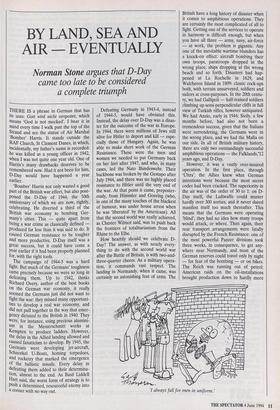BY LAND, SEA AND AIR - EVENTUALLY
Norman Stone argues that D-Day
came too late to be considered a complete triumph
THERE IS a phrase in German that has its uses: Gott wird nicht verspottet, which means 'God is not mocked'. I bear it in mind every time I walk past the top of the Strand and see the statue of Air Marshal `Bomber' Harris. It stands outside the RAF Church, St Clement Danes, in which, incidentally, my father's name is recorded: he was killed as a young officer in 1942, when I was not quite one year old. One of Harris's many drawbacks deserves to be remembered now. Had it not been for him, D-Day would have happened a year earlier.
`Bomber' Harris not only wasted a good part of the British war effort, but also post- poned the D-Day of 1944, the 50th anniversary of which we are now, rightly, celebrating. He diverted a third of the British war economy to bombing Ger- many's cities. This — quite apart from being a war crime as classically defined produced far less than it was said to do. It caused German resistance to be tougher and more productive. D-Day itself was a great success, but it could have come a year earlier if it had been properly planned for, with the right tools. The campaign of 1944-5 was a hard fight. But much of the Germans' toughness came precisely because we were so long in defeating them. Up to 1942, thinks Richard Overy, author of the best books on the German war economy, it really seemed the Germans just did not want to fight the war: they missed many opportuni- ties to develop a real war economy, and did not pull together in the way that emer- gency dictated to the British in 1940. They were, for instance, using precious alumini- um in the Messerschmitt works at Kempten to produce ladders. However, the delay in the Allied landing allowed and caused fanaticism to develop. By 1945, the Germans were developing jet-aircraft, Schnorkel U-Boats, homing torpedoes, and rocketry that marked the emergence of the ballistic missile. Every delay in defeating them added to their determina- tion, almost to the end. As Basil Liddell Hart said, the worst form of strategy is to push a determined, resourceful enemy into a corner with no way out. Defeating Germany in 1943-4, instead of 1944-5, would have obviated this. Instead, the delay over D-Day was a disas- ter for the outcome of the war in Europe. In 1944, there were millions of Jews still alive for Hitler to deport and kill — espe- cially those of Hungary. Again, he was able to make short work of the German Resistance. These were the men and women we needed to put Germany back on her feet after 1947, and who, in many cases, led the Nato Bundeswehr. Their backbone was broken by the Gestapo after July 1944, and there was no highly placed resistance to Hitler until the very end of the war. At that point it came, preposter- ously, from Himmler and Goering (who, in one of the many touches of the blackest of humour, was under house arrest when he was 'liberated' by the Americans). All that the second world war really achieved, as Chester Wilmot said, was to push back the frontiers of totalitarianism from the Rhine to the Elbe.
How heartily should we celebrate D- Day? The answer, as with nearly every- thing to do with the second world war after the Battle of Britain, is with two-and- three-quarter cheers. As a military opera- tion, it commands vast respect. The landing in Normandy, when it came, was certainly an astonishing feat of arms. The British have a long history of disaster when it comes to amphibious operations. They are certainly the most complicated of all to fight. Getting one of the services to operate in harmony is difficult enough, but when you have all three — army, navy, air-force — at work, the problem is gigantic. Any one of the inevitable wartime blunders has a knock-on effect: aircraft bombing their own troops, paratroops dropped in the wrong place, ships dropping at the wrong beach and so forth. Disasters had hap- pened at La Rochelle in 1629, and Walcheren Island in 1809: classic cock-ups both, with terrain unsurveyed, soldiers and sailors at cross-purposes. In the 20th centu- ry, we had Gallipoli — half-trained soldiers climbing up semi-perpendicular cliffs in full view of Turkish rifles, however antiquated. We had Anzio, early in 1944; Sicily, a few months before, had also not been a tremendous success, given that the Italians were surrendering, the Germans were in the wrong place, and we had the Mafia on our side. In all of British military history, there are only two outstandingly successful amphibious operations — the Falklands,*12 years ago, and D-Day.
However, it was a vastly over-insured operation. In the first place, through `Ultra', the Allies knew what German intentions were because the most secret codes had been cracked. The superiority in the air was of the order of 30 to 1: on D- Day itself, the Luftwaffe could muster hardly over 300 sorties, and it never dared manifest itself too much thereafter. This means that the Germans were operating `blind': they had no idea how many troops would attack, or where. Then again, their rear transport arrangements were fatally disrupted by the French Resistance: one of the most powerful Panzer divisions took three weeks, in consequence, to get any- where near Normandy, and most of the German reserves could travel only by night — for fear of the bombing — or on bikes. The Reich was running out of petrol: American raids on the oil-installations brought production down to hardly more '1 always fall for men in uniform.' than a tenth of its usual levels. Once the Allies were in France, the Luftwaffe itself could not, because of this, train pilots; planes were towed to their take-off points by oxen to save petrol for the flight. In this way, the Allied beachheads and bridge- heads could be held, while artificial har- bours, an under-Channel pipe-line and much other ingenious equipment were installed.
The work of surveying enemy installa- tions, of detailed planning even of minus- cule infantry operations, had been done over months or even years before, and the camouflaging of Allied intentions had also been carried out with enormous care. A whole dummy army was built up in south- eastern and eastern England, and even for some days after the real invasion-force had landed German troops were pinned down in the Pas de Calais. Besides, many of the German divisions on the ground were very poor indeed — under strength, often recruited from pressed Silesian Poles or even former prisoners-of-war. These were all that the German army, which had lost its guts in eastern Europe, could manage.
When D-Day happened, it was really only just mopping up the bits. Admittedly, these bits were complicated and tough. However, the German army had already been beaten in the East. While the Allies staged their six-weeks fight on the beach- heads and just beyond, the Russians had destroyed the whole of Heeresgruppe Mitte in an offensive that started on 20 June. Soon they were on to the Baltic, driving their tanks into Elbing while the trams were still running. By July, they were on the Vistula, and the defeat of Heeresgruppe Sudukraine was so severe that the Balkan satellites — Rumania, for instance — changed sides in August, the day before Paris fell. So D-Day came too late to stop Stalin from taking over Cen- tral Europe.
Was there anything sinister in this delay as Moscow so often supposed? Probably not. British bungling is sometimes so com- prehensive as to appear to be part of some deep-laid plot. No one has ever managed to show that Churchill or anyone else deliberately delayed D-Day so as to let the Russians and the Germans bleed each other white. Part of the reason for the delay was that Churchill and many others desperately feared another western front — or a repetition, in the west, of the hor- rors that all knew so well on the eastern front. All the way along in the latter stages of the second world war, you sense that commanders mistrusted their men: would they actually dig in and fight? Episodes such as the fall of Tobruk in June 1942 suggested not, and Churchill himself noted on one occasion that the men were just not what they had been in 1914-18.
With the Americans it was even worse — hence the extraordinary lumber with which their troops moved around to make them feel loved and at home. Again and again, Churchill shrank from putting troops into France, and he kept finding ways of putting them somewhere else. Italy was the favoured spot, but what a strange misjudg- ment that was The terrain was impossible — baking hot or icy cold, mountainous and with very poor supply-lines. The Germans had not much difficulty in holding down the Allies with only 20 divisions. The Americans had wanted a direct invasion of north-western France, but by the time the British had diverted so many resources around the Mediterranean, often in inef- fectual dribs and drabs, their intentions were frustrated until 1944.
However, the needs of the bombing offensive were the most commanding obstacle. Harris had claimed all along that his policy of bashing the heart of Ger- many's cities would cause the enemy to col- lapse. The government hardly dared to say in public that it was waging war against women and children in enormous numbers, but that is what it was doing. Yes, it did cause diversion of German resources, as Albert Speer, Hitler's armaments minister, confessed when they let him out of Span- dau. But would not a policy of carefully planned bombing of specific industrial tar- gets have done the same? Harris never believed that this could be done. He even opposed one of the great demonstrable successes of the French campaign of 1944, the bombing of the Seine bridges, on the grounds that this kind of precision could not be achieved.
A few months before D-Day, he was telling Churchill that the war could be won by April 1944 provided he had all of the resources to flatten German cities. Instead, as we know, he just fired the Germans to resist more strongly, weakened the resources that the British and Americans had to put into the land campaign in France, and thereby prolonged the war. It should have been ended in 1943-4 on lines that the Americans had been timidly proposing. Once Rommel had been penned in the central part of North Africa — Tunisia — he could simply have been left to rot on the vine, as for that matter could Italy. A landing in France, properly prepared, would have encountered only the shadow of a Westwall, and would have found the Germans endlessly split up else- where. It is when we think of the might- have-beens that we see why D-Day is a matter for only two-and-three-quarter cheers.




























































 Previous page
Previous page